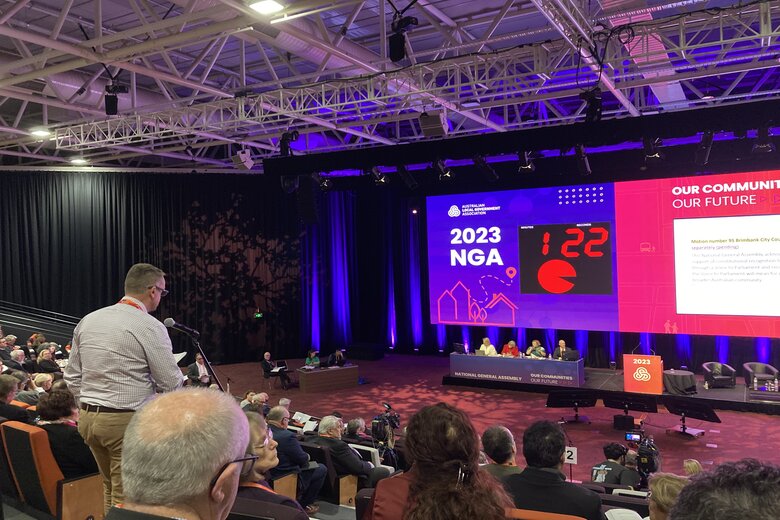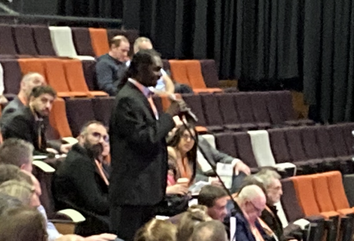
Australian councils have voted against mandatory fuel efficiency standards, nuclear energy and tyre levies; but in favour of an Indigenous Voice to Parliament, mandatory super for councillors, and the relocation of fruit bats.
Meeting in Canberra for the National General Assembly of the Australian Local Government Association (ALGA) last week, more than 1,100 delegates representing the nation’s 537 councils had a chance to have their say on the policy positions to be adopted by their peak organisation.
While the votes aren’t binding on ALGA, they provide an insight into the issues that unite councils, and the schisms that exist between them – often linked to the metropolitan/regional divide.
Voting on almost 150 motions took place over two days. In case you weren’t there, here are some highlights:
INDIGENOUS VOICE TO PARLIAMENT (carried)

The assembly heard lengthy debate on a motion from Brimbank City Council to acknowledge the federal government’s support for an Indigenous Voice to Parliament, which passed 98 votes to 71.
Among the arguments heard against the motion was that the Voice was a federal issue, and “referendums are not about being told what to do … by ALGA”. It was also put forward that “it is not a local government’s place to be forcing more politics down our constituent’s necks”.
But Cr Cyril Bukulatjri from East Arnhem Regional Council said the motion acknowledged the value of working together.
“We are here not to debate, we are here just to acknowledge how (we) can strategically plan for the future … just to hear our voice,” he said.
NUCLEAR ENERGY (defeated)
Gunnedah Shire Council in NSW moved for a lifting of restrictions preventing nuclear energy from being developed as an alternative to coal-fired power stations
The assembly heard arguments that nuclear energy could help ensure surety of supply, was working overseas and should be part of the mix in Australia, including small modular reactors.
However, it also heard that nuclear energy was slow to get up-and-running, expensive, inflexible and dangerous.
The motion was narrowly defeated 88 votes to 90.
MANDATORY FUEL EFFICIENCY STANDARDS (defeated)

Delegates voted down motions calling on the federal government to implement mandatory fuel efficiency standards for both heavy and light vehicles.
Proponents of the motion argued that introducing mandatory standard would bring more lower and zero emissions vehicles into Australia had help councils transition to EVs.
Objecting to the motion, Broken Hill Mayor Tom Kennedy said the motions would impose an additional cost on rural communities, which were also poorly equipped in terms of charging infrastructure.
“We should not be put at a disadvantage by a policy that will ensure petrol and diesel driven cars are much more expensive than what they need to be,” he said.
ETHICAL INVESTMENTS (defeated)
Motions calling for banks to offer investment products to local government that didn’t contribute to climate change, and for local government super funds to divest from companies engaging in fossil fuels, logging, gambling, tobacco and weapons also proved controversial, and were defeated.

Cr Mark Drury from Inner West Council said many local governments were interested in finding investment opportunities that didn’t contribute to climate change, but often struggled to identify sustainable and ethical options.
“What this motion asks is that we approach the Australian Banking Association to discuss with them to convince them to offer more of these products so that councils that wish to use them can use them,” he said.
However arguments were made that the motion represented a push towards trying to dictate to councils how they should be investing their money, while working against a coal sector that will be needed in the next few decades to create clean energy projects.
Tenterfield Mayor Bronwyn Petrie argued that logging was a very important industry and “with regards to weapons we’ve been supporting Ukraine and we’re not supporting them with rubber bullets, I can tell you that. So what are we doing with weapons manufacture up there?”
MANDATORY SUPER FOR COUNCILLORS (carried)
Newcastle City Council argued for amendments to superannuation laws so all councillors across Australia automatically receive the Superannuation Guarantee Contribution, to which councillors, mayors, and Lord Mayors in some jurisdictions including NSW aren’t currently entitled.
“The compulsory payment to all mayors, Lord Mayors and councillors across Australia would encourage diversity and ensure local councils reflect their communities,” the motion stated.
if your council can’t afford to pay superannuation on the pittance that you are paid you should not be running the council.
Mayor Phyllis Miller
Forbes Mayor Phyllis Miller said “if your council can’t afford to pay superannuation on the pittance that you are paid you should not be running the council. If you pay peanuts you get monkeys and I’ve seen a lot of those.”
But delegates heard arguments it was appropriate for councils to decide for themselves how they spent their budget, including on superannuation for councillors.
The motion was decisively carried 159 votes to 57
TYRE LEVY (defeated)
Murweh Shire in Queensland put forward a motion for a local government levy on all imported and locally produced tyres to help councils with the cost of disposal, citing prohibitive disposal and recycling costs for most LGAs.
The motion went down 70 votes to 85, with opponents arguing a levy would end up being passed on and would disadvantage people in regional areas who didn’t have the public transport options of their metropolitan counterparts and relied on their cars.
BENEFIT FEE FOR RENEWABLE PROJECTS (carried)
A motion calling for federal legislation requiring some of the income from renewable energy projects to pay a “local benefit” fee was opposed, but carried 112 votes to 81.
The motion, put forward by Balonne Shire Council in Queensland, proposed making it mandatory for all renewable energy projects to be reported to local councils, and for proponents to make a capacity-based community contribution fee.
Cr David Walsh from the City of Canterbury Bankston said the motion placed a cost burden on renewable energy projects.
If we’re going to combat climate change we need to do everything in our power to encourage renewable energy projects.
Cr David Walsh
“If we’re going to combat climate change we need to do everything in our power to encourage renewable energy projects,” he argued.
But Cr Kennedy argued “it’s fine for the people that don’t have renewables to say there shouldn’t be compensation for the communities that do.
“But for the communities that do, we put up with wind turbines, we put up with solar panels that can contribute to heat on the outskirts of town…. I’m a proponent of renewable energy, but those communities that live with it should be given incentives.”
RELOCATING FRUIT BATS (carried)
Queensland’s Whitsunday Regional Council moved a motion calling for a damage mitigation permit to help move fruit bats from urban areas.
Speaking to the motion, Mayor Julie Hall said “We are not looking to murder any bats here”, but added they were noisy, smelly and created health issues for humans, and a national approach to managing them was needed.
We’re not looking to murder an bats here.
Mayor Julie Hall
However arguments were put by Wollongong City Council that fruit bat colonies are highly mobile and eventually disperse. Delegates also heard the species were highly vulnerable and played an important role in the ecosystem.
In reply, Cr Danita Potter from South Burnett Regional Council, said management of fruit bats came at a “phenomenal” cost to council.
“Believe me, its not an easy task. Because the bats come back. All the bloody time.”
The motion passed 93 votes to 44.
Comment below to have your say on this story.
If you have a news story or tip-off, get in touch at editorial@governmentnews.com.au.
Sign up to the Government News newsletter